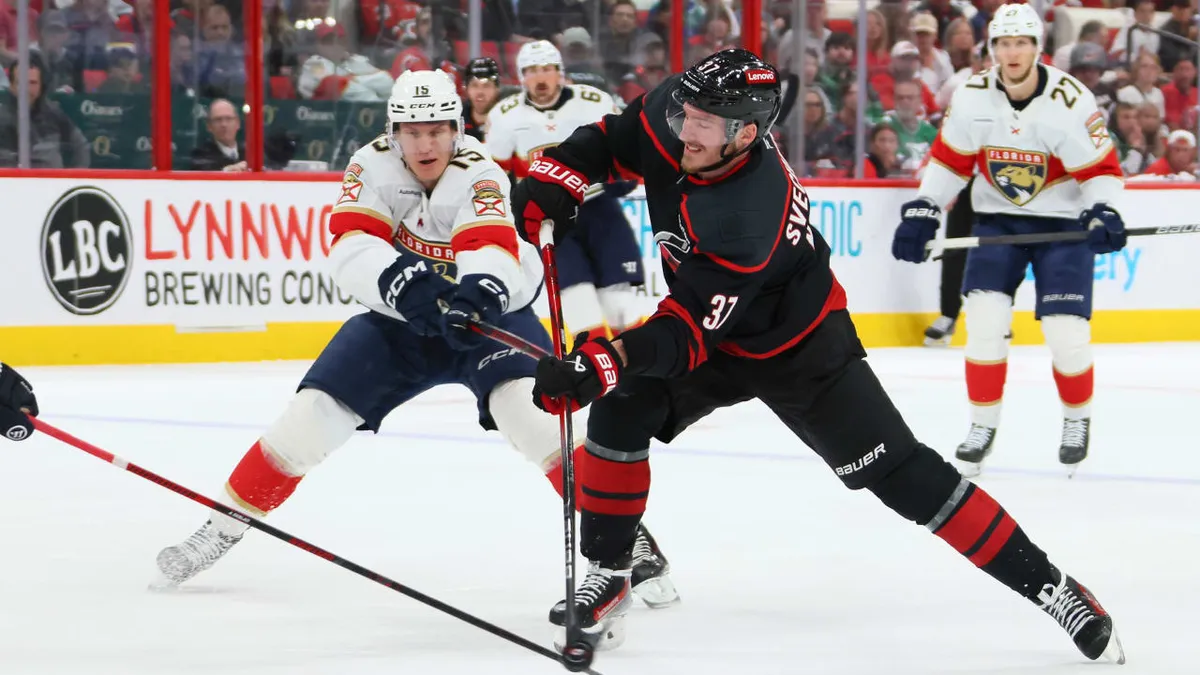
After suffering a disappointing loss in the first two games of the Eastern Conference Final at home, the Carolina Hurricanes must refocus their strategy as they head into Game 3 on Saturday. To turn their fortunes around, the team should closely examine their performance in the first period of Game 3 and build from there. It’s vital for the Hurricanes to embrace a gritty road game mentality, as they possess the talent and capability to succeed. However, they must address several key areas to improve their game.
Coming off a staggering 5-0 defeat in Game 2, the Hurricanes must prioritize their effort and commitment to effective checking. The team needs to demonstrate a strong defensive presence without compromising their offensive strategies. Throughout Game 2, Florida scored all three of their 5-on-5 goals due to Carolina’s defensive lapses, which were largely preventable. For instance, on the Panthers' opening goal, scored by Gustav Forsling, Carolina's defenseman Sean Walker strayed too far forward, allowing an easy transition for Florida's offense after a turnover by Andrei Svechnikov.
The Hurricanes’ struggles were evident as they faced an overwhelming situation where three Panthers players outnumbered Carolina’s lone defender, Dmitry Orlov, in front of the net. This pattern continued with Florida's second goal, which stemmed from another turnover by Svechnikov, leading to a quick play by Carter Verhaeghe. Carolina's defensive strategy often relies on man-to-man coverage, but it faltered when Orlov drifted too far up, leaving the Hurricanes vulnerable to a 2-on-1 situation that resulted in another goal.
Florida's effectiveness in forechecking and their ability to capitalize on Carolina's mistakes were critical factors in their Game 2 victory. The Panthers demonstrated superior work ethic, consistently beating the Hurricanes to crucial spots on the ice. For Carolina to reverse their fortunes in Game 3, they need to return to the relentless forechecking style that characterized their performance in earlier playoff rounds. The Hurricanes need to generate more shots on goal; they managed only 17 in Game 2, which is far below their usual output.
When the Hurricanes are at their best, they tirelessly pursue the puck and aggressively reload their offensive strategies. If Carolina can implement a three-high approach by moving a forward into the middle of the zone, they can disrupt Florida's defensive structure and create scoring opportunities. The ability to pressure the Panthers' defensemen into making mistakes is crucial. By forcing turnovers and transitioning the puck from low to high, Carolina can enhance their offensive zone time, leading to more shots on goal and scoring chances.
Another critical area for improvement is the Hurricanes' discipline on the ice. Andrei Svechnikov, in particular, must avoid taking unnecessary penalties, such as the roughing call that led to a power-play goal for Florida. With the Panthers converting 4 out of 5 power-play opportunities in the first two games, Carolina cannot afford to give them extra chances. The Panthers are currently demonstrating superior discipline and defensive skills, consistently winning battles along the boards and effectively breaking out of their zone.
The pressure is mounting for the Hurricanes, particularly given their streak of 14 consecutive losses in the conference finals. Falling behind early in Game 2 added to the urgency, but the team must maintain composure and adhere to their game plan. Rushing to score can lead to more mistakes, which has been evident in recent games. Instead, Carolina should focus on enhancing their pace and maintaining a strong defensive posture while aggressively pursuing the puck offensively.
Despite the challenges presented by the Panthers, there are still opportunities for the Hurricanes to exploit. Florida sometimes funnels back too quickly into their defense, creating chances for Carolina, particularly with a fourth man joining the rush. To capitalize on these opportunities, the Hurricanes must emphasize their work ethic and commitment to a disciplined, strategic approach to both offense and defense.
Ultimately, the success of the Carolina Hurricanes in Game 3 will depend on their ability to adapt and execute their game plan effectively. By addressing their defensive positioning, enhancing their forechecking, maintaining discipline, and leveraging opportunities against Florida's defense, the Hurricanes can take a significant step towards turning the series around.